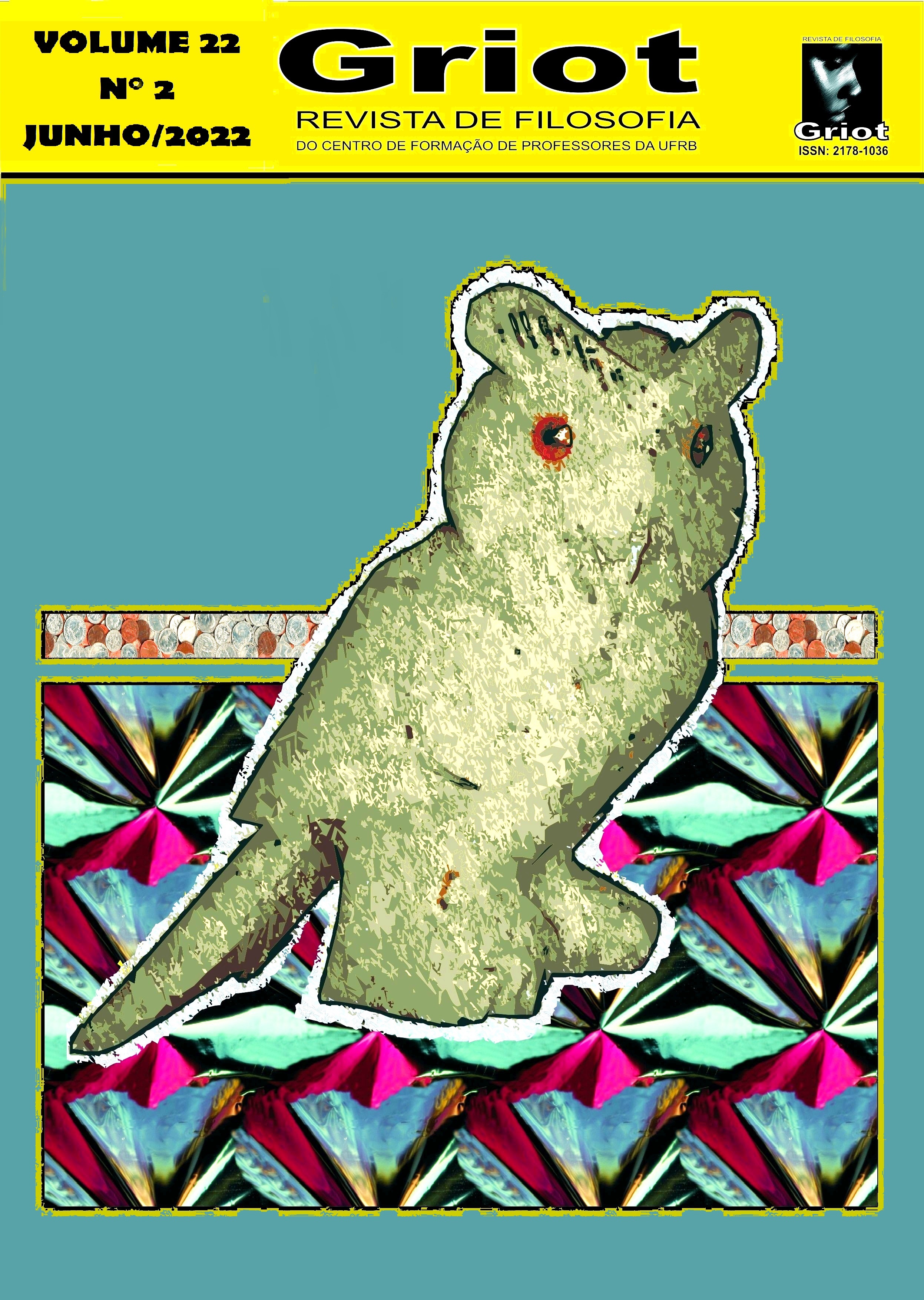Suffering and the question of God: a reading of Levinas in times of pandemic
DOI:
https://doi.org/10.31977/grirfi.v22i2.2930Keywords:
Evil; God; Lévinas; Pandemic; Theodicy.Abstract
This article aims to present how the philosopher Emmanuel Lévinas understands the issues of suffering and evil in the world, hardships frequently considered as obstacles to the belief in God. Breaking away from the logic of theodicies, the French-Lithuanian philosopher developed original and instigating perspectives on these themes, placing them in an eminently ethical domain. It concerns an ethic that escapes reciprocity, in a context of asymmetry, with the granting of absolute priority to the other man. Such reflections are particularly relevant in the dramatic scenario established by the Covid-19 pandemic, which has given rise to suffering, death, and several uncertainties, among which the narrative of God. The new coronavirus has sparked a crisis of global dimensions, which raises the need for a new civilizational paradigm, prioritizing principles such as cooperation, human solidarity and ethical responsibility towards others, a horizon in which Lévinas' conceptions are included.
Downloads
References
BAUMAN, Zygmunt. Ética pós-moderna. São Paulo: Paulus, 1997.
BIRMAN, Joel. O trauma na pandemia do Coronavírus. Rio de Janeiro: Civilização Brasileira, 2020. E-book.
BOFF, Leonardo. Covid-19 a mãe terra contra-ataca a humanidade: advertências da pandemia. Petrópolis: Vozes, 2020.
CAMPOS, Fabiano Victor de Oliveira. O Deus “outramente que ser” de Emmanuel Levinas. Horizonte, Belo Horizonte, v. 17, n. 53. 2019, p. 1249-1282.
CHALIER, Catherine. La persévérance du mal. Paris: Du Cerf, 1987.
CHRISTAKIS, Nicholas A. Apollo's Arrow: The Profound and Enduring Impact of Coronavirus on the Way We Live. New York: Little, Brown and Company, 2020. E-book.
COSTA, José André da. Crítica ao modelo moderno de subjetividade: a proposta de subjetividade no pensamento de Levinas. In: CARBONARI, Paulo César; COSTA, José André da; DALMÁS, Giovana (Org.). Ética, educação e direitos humanos: estudos em Emmanuel Levinas. Passo Fundo: IFIBE, 2008, p. 157-178.
DUPUY, Jean-Pierre. Ainda há catástrofes naturais? Análise Social, Lisboa, vol. 41, n. 181, Tecnologia: Perspectivas críticas e culturais, Instituto Ciências Sociais da Universidade de Lisboa, 2006, p. 1181-1193.
FACKENHEIM, Emil. La présence de Dieu dans l’histoire: affirmations juives et réflexions philosophiques après Auschwitz. Paris: Verdier,1980.
HANUS, G. 2008. Le mal : entre facticité et théodicée. In: C. BRENNER; G. HANUS. Cahiers d’Etudes Lévinassiennes, 2008 nº 7 : Le mal. Arcueil, Institut d’Etudes Lévinassiennes, p.51-64.
HARARI, Yuval Noah. Notas sobre a pandemia: e breves lições para o mundo pós-coronavírus. São Paulo: Companhia das Letras, 2020.
LEIBNIZ, Gottfried Wilhelm. Ensaios de teodiceia sobre a bondade de Deus, a liberdade do homem e a origem do mal. 2.ed. São Paulo: Estação Liberdade, 2017.
LÉVINAS, Emmanuel. Autrement qu’être : ou au-delà de l’essence. Paris : Kluwer Academic, 1978. (Le livre de poche).
LÉVINAS, Emmanuel. De Dieu qui vient à l’idée. 2ª ed., Paris : Vrin, 2004.
LÉVINAS, Emmanuel. Difficile liberté : essais sur le judaïsme. 3.ed. Paris : Albin Michel, 2010.
LÉVINAS, Emmanuel. Entre nous : essais sur le penser-à-l’autre. Paris : Grasset, 1991. (Le livre de poche).
LÉVINAS, Emmanuel. Entretiens Emmanuel Lévinas/ François Poirié. In : POIRIÉ François. Emmanuel Levinas : essai e entretiens. Paris : Actes Sud, 1996. p. 59 a169.
LÉVINAS, Emmanuel. Éthique et infini: dialogues avec Philippe Nemo. Paris: Fayard, 1982. (Le livre de poche).
MESSINA, Aïcha Liviana. Souffrance éthique et souffrance tragique : l’élaboration lévinassienne de la critique nietzschéenne de la compassion. Kriterion, Belo Horizonte, nº 134, 2016, p. 379-399.
NIETZSCHE, Friedrich. O anticristo. Lisboa: Edições 70, 2104. E-book.
OMBROSI, Orietta. Souffrances inutiles : La fin de la théodicée d'après E. Levinas. Gregorianum, Roma, Vol. 87, No. 2, 2006, p. 368-379.
PIVATTO, Pergentino S. Ética da alteridade. In: OLIVEIRA, Manfredo A. de (org.). Correntes fundamentais da ética contemporânea. 5ª ed. Petrópolis: Vozes, 2014, p. 79-97.
REA, Caterina. Retrait de Dieu et question du mal : une lecture éthique du mythe de Hans Jonas. Revue philosophique de Louvain. Louvain, v. 100, n. 3, 2002, p. 527-548.
SCHWARCZ, Lilia Moritz; STARLING, Heloisa Murgel. A bailarina da morte: a gripe espanhola no Brasil. São Paulo: Companhia das Letras, 2020. E-book.
SIDEKUM, Antônio. Ética e direitos humanos em Emmanuel Levinas. In: CARBONARI, Paulo César et al. Ética, educação e direitos humanos: estudos em Emmanuel Levinas. Paso Fundo: IFIBE, 2008, p. 157-178.
ZAKARIA, Fareed. Dez lições para o mundo pós-pandemia. Rio de Janeiro: Intrínseca, 2021. E-book.
ZIELINSKI, Agata. Levinas : la responsabilité est sans pourquoi. Paris : PUF, 2015. E-book.
ŽIŽEK, Slavoj. Pandemia: A covid-19 sacode o mundo. Vigo: Editorial Galaxia, 2020. E-book.
Downloads
Published
How to Cite
Issue
Section
License
Copyright (c) 2022 Fabiano Victor de Oliveira Campos, Luiz Fernando Pires Dias

This work is licensed under a Creative Commons Attribution 4.0 International License.
The authors who publish in Griot: Revista de Filosofia maintain the copyright and grant the magazine the right of first publication, with the work simultaneously licensed under the Creative Commons Attribution 4.0 International License, allowing sharing and adaptation, even for commercial purposes, with due recognition of authorship and initial publication in this journal. Read more...









































































